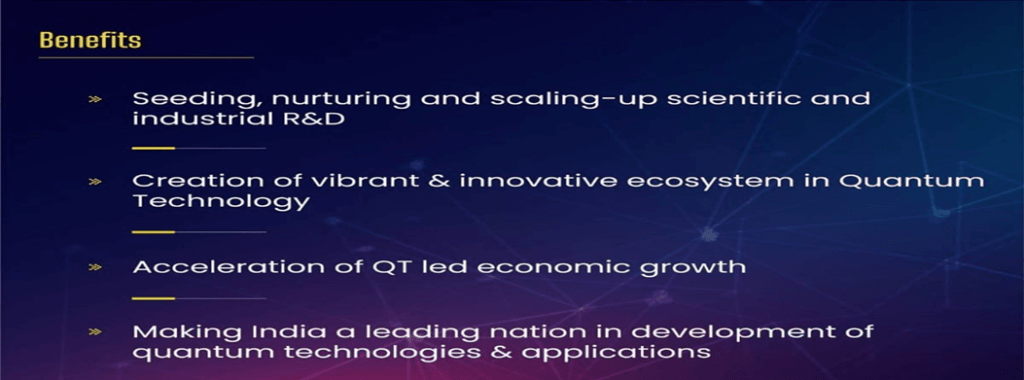The Union Cabinet recently approved the National Quantum Mission (NQM), a major initiative aimed at enhancing India’s research and development in the quantum domain. The NQM will involve the development of quantum-based computers that are capable of handling complex problems in a highly secure manner. The project will be led by the Department of Science and Technology (DST), with the support of other departments.
About the NQM
The NQM has a total cost of Rs. 6003.65 crore, which will be incurred from 2023-24 to 2030-31. India will now be among the top six nations involved in the research and development of quantum technologies, including the US, Canada, France, Finland, China, and Austria.

Focus of the NQM
The NQM aims to develop satellite-based secure communications between a ground station and a receiver located within 3,000 km during the first three years. NQM will also lay communication lines using Quantum Key Distribution over 2,000kms for satellite-based communication within Indian cities. For long-distance quantum communication with other countries, tests will be conducted in the coming years.
The mission will focus on developing quantum computers (qubit) with physical qubit capacities ranging from 50 to 1000 qubits, to be developed over the next eight years. Computers up to 50 physical qubits will be developed over three years, 50-100 physical qubits in five years, and computers up to 1000 physical qubits in eight years. The NQM will also support the design and synthesis of quantum materials such as superconductors, novel semiconductor structures, and topological materials for the fabrication of quantum devices.
Four Thematic Hubs (T-Hubs) will be set up in top academic and National R&D institutes on the domains – Quantum Computing, Quantum Communication, Quantum Sensing & Metrology, and Quantum Materials & Devices. The hubs will focus on generating new knowledge through basic and applied research as well as promote R&D in areas that are mandated to them.
Significance of NQM
The NQM has significant applications in various sectors ranging from healthcare and diagnostics, defence, energy, and data security. It can take the technology development ecosystem in India to a globally competitive level. The NQM will also help develop magnetometers with high sensitivity in atomic systems and Atomic Clocks for precision timing, communications, and navigation.
The project will greatly benefit the communication, health, financial, and energy sectors, as well as drug design and space applications. It will provide a significant boost to national priorities like Digital India, Make in India, Skill India and Stand-up India, Start-up India, Self-reliant India, and Sustainable Development Goals (SDG).
What is Quantum Technology?
Quantum Technology is based on the principles of Quantum mechanics developed in the early 20th century to describe nature at the scale of atoms and elementary particles. It is manifested through applications in secure communication, disaster management through better prediction, computing, simulation, chemistry, healthcare, cryptography, and imaging, among others.

Why In News
The Union Cabinet’s approval of the National Quantum Mission (NQM) marks a significant milestone for India’s quantum technology development, propelling it to the league of top six nations in this field. This initiative reflects India’s commitment to strengthening its capabilities in quantum research and development, and will pave the way for a wide range of applications in various sectors.
MCQs about Significance of India’s National Quantum Mission
-
What is the National Quantum Mission (NQM)?
A. A mission to explore outer space
B. A mission to develop quantum technologies and build quantum-based computers
C. A mission to reduce pollution in major cities
D. A mission to improve the agricultural sector in India
-
What is the focus of the National Quantum Mission (NQM)?
A. To develop quantum-based computers
B. To explore outer space
C. To improve the agricultural sector in India
D. To reduce pollution in major cities
-
Which department will lead the National Quantum Mission in India?
A. Department of Science and Technology (DST)
B. Department of Atomic Energy (DAE)
C. Ministry of Electronics and Information Technology (MeitY)
D. Ministry of Education
Boost up your confidence by appearing our Weekly Current Affairs Multiple Choice Questions
![]()


